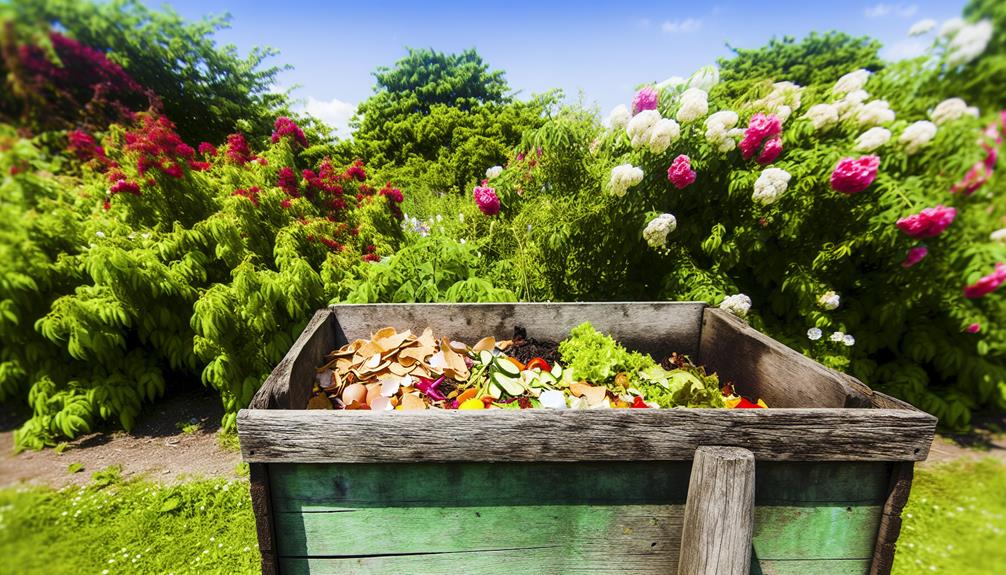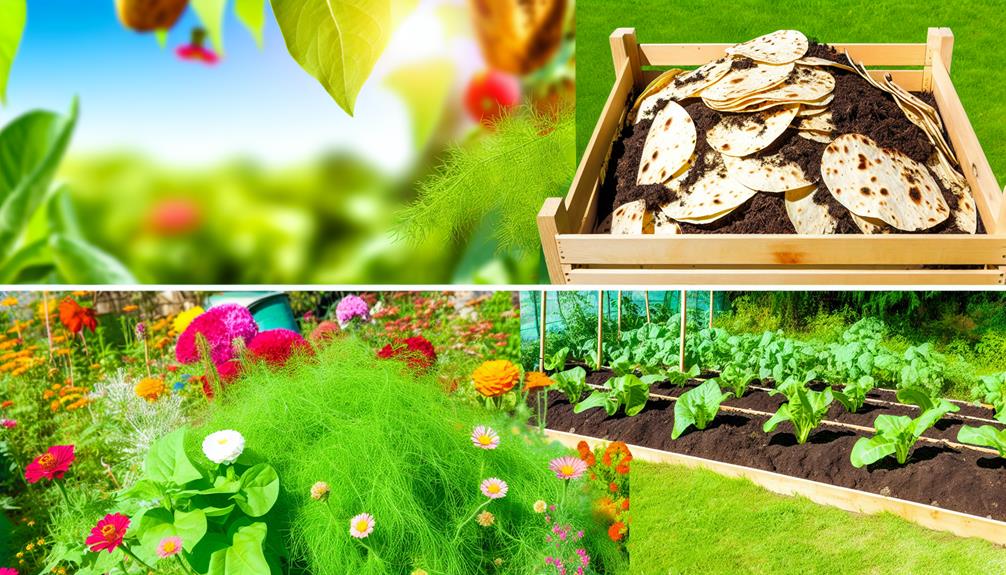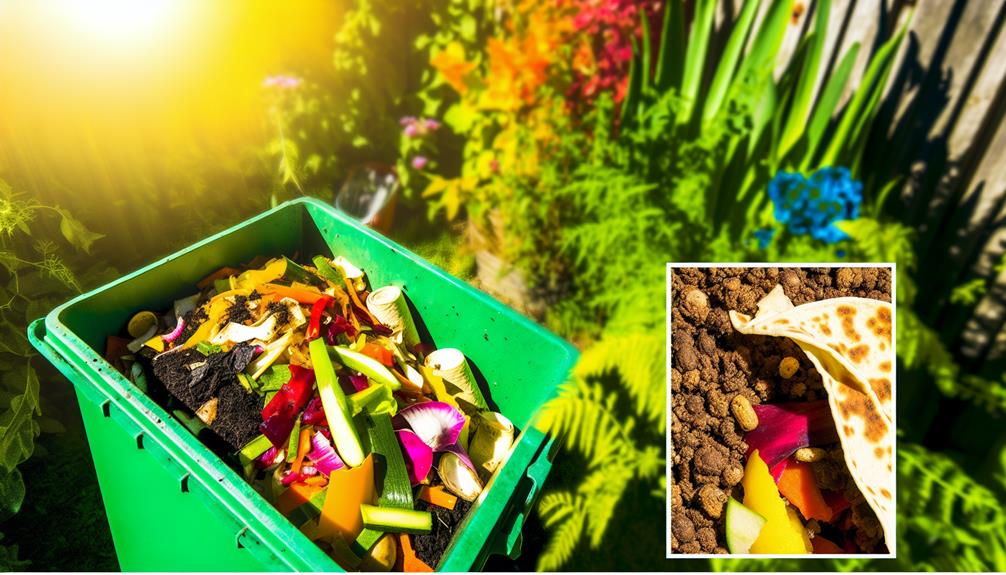

You can compost tortillas, providing valuable nutrients to your soil. Tear them into smaller pieces to speed up decomposition. Balance your compost pile with a mix of browns (carbon-rich) and greens (nitrogen-rich). Keep moisture levels similar to a wrung-out sponge and turn the pile regularly.
Watch out for mold and pests; bury tortillas deep in the pile to avoid attracting unwanted visitors. Both corn and flour tortillas can be composted, but refined flour ones may take longer to break down. If you follow these tips, your compost pile will thrive. There’s more to explore about effective composting strategies.
Have you ever wondered what items can be tossed into your compost bin? Understanding what’s compostable is essential if you want to create a thriving compost system.
Compost bins thrive on a balanced mix of green waste and other organic materials. Green waste includes items like fruit and vegetable scraps, coffee grounds, and grass clippings. These materials are rich in nitrogen, which helps fuel the composting process.
But it’s not just green waste you should add. You can also include items like eggshells, tea bags (make sure they’re compostable), and even cardboard if it’s shredded. These add carbon to the mix, balancing out the nitrogen-rich green waste.
Your compost bin will benefit from this balanced diet, breaking down materials more efficiently.
Also Read: Can You Compost Bones?
Once you’ve assembled your compostable items, the real magic begins as they start breaking down into nutrient-rich compost. At the heart of this process is composting science, which transforms your organic waste into valuable soil.
Microbial activity plays an essential role here. Microorganisms such as bacteria and fungi decompose the organic material, converting it into humus, a dark, rich substance that enhances soil health.
To make sure your tortillas and other compostable items break down efficiently, consider the following steps:
Composting tortillas offers numerous benefits, including reducing food waste and enriching your garden soil with essential nutrients. By composting your leftover tortillas, you promote food sustainability and take a meaningful step toward waste reduction. Instead of sending tortillas to the landfill, where they contribute to methane emissions, you can turn them into valuable organic matter for your compost pile.

To compost tortillas, simply tear them into smaller pieces. This helps them break down faster. Add them to your compost bin along with other kitchen scraps like vegetable peels and coffee grounds. Maintain a good balance of greens (nitrogen-rich materials) and browns (carbon-rich materials) to sustain a healthy compost system. Tortillas, being relatively neutral, fit well into this mix.
As the tortillas decompose, they release essential nutrients back into the soil, improving its structure and fertility. This results in healthier plants and more productive gardens. By integrating tortilla composting into your routine, you’re not only minimizing waste but also contributing to a circular economy where every bit of food is valued.
Incorporating tortilla composting into your lifestyle is a simple yet impactful way to support environmental sustainability and build a greener community.
Also Read: Can You Compost Body Wash?
While composting tortillas offers many benefits, you might encounter a few challenges along the way. Understanding these challenges will help you manage your compost pile more effectively.
Here are three key issues you might face:
Also Read: Can You Compost Black-Eyed Peas?
How can you optimize your composting process to handle tortillas effectively? Start by focusing on your compost bins. Make sure they’re well-ventilated to support proper aeration techniques. Good airflow is essential to break down organic matter like tortillas efficiently. Choose a bin with multiple air holes or slots to promote oxygen flow.

Next, layer your compost materials correctly. Begin with a base layer of coarse materials like twigs or straw. This helps with drainage and aeration. Add a layer of green materials—kitchen scraps like fruit and vegetable peels are perfect. Follow this with a layer of brown materials such as dried leaves or cardboard. When adding tortillas, tear them into smaller pieces to speed up decomposition.
Turn your compost regularly. Aeration techniques like turning the pile with a pitchfork or compost turner make sure oxygen reaches all parts of the pile. This prevents anaerobic conditions, which can slow decomposition and produce unpleasant odors.
Yes, composted tortillas can attract pests or rodents. To guarantee pest prevention, you should bury tortillas deep in the compost and use natural rodent deterrents like citrus peels or mint. You’ll help keep your compost community thriving.
You should make sure not to compost moldy tortillas as they can attract pests. Gluten-free tortillas are fine to compost, just make certain they’re not moldy. You’ll keep your compost healthy and your garden community thriving by following this advice.
You can use simple tortilla storage methods like placing them in a sealed container or bag in the fridge. Pre composting methods include freezing them if you can’t compost right away, ensuring they stay fresh for your compost pile.
You’ll know tortillas are breaking down properly when you see increased microbial activity and a faster decomposition rate. Look for a rich, earthy smell and the tortillas becoming unrecognizable, blending into the compost.
You can definitely compost tortillas in a small indoor compost bin. Indoor composting benefits include reducing waste and enriching soil. By composting, you’re joining a community that values sustainability and making a positive impact.
To guarantee you can compost tortillas effectively, follow a few simple guidelines. Make sure they’re broken into smaller pieces for quicker decomposition.
Mix them with a balance of green and brown materials to maintain a healthy compost pile.
Watch for signs of pests, and turn your compost regularly for best results.
By doing so, you’ll not only reduce waste but also enrich your garden soil with valuable nutrients. Composting tortillas is a practical step towards sustainability.
